Australian Open, Melbourne
January 15, 1990; 128 Draw (16 seeded) – $1,462,000; Surface – Hard
The tournament is associated with John McEnroe’s default – the first Grand Slam disqualification in the Open era. Boris Becker’s 18-match winning streak at majors was snapped by a rejuvenated Mats Wilander, for whom it was a ‘swan song’ though. In some sense we can relate it also to Ivan Lendl; the Czechoslovak defended his title, but left the throne a few months later. 19-year-old Pete Sampras, won the longest Australian Open match at the time, and proclaimed himself as a real deal.
The compilation based on articles written by the Associated Press (except the final).
All scorelines
First round: AP
Pete Sampras counts his youth an advantage in his ascent through the tennis rankings. “I’m just going to slowly but surely work my way up the rankings. I didn’t expect to be in the top 10 when I was 18,” said the Californian, after notching the Australian Open’s first major upset with a record-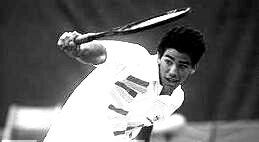 setting 7-6(6), 6-7(5), 4-6, 7-5, 12-10 victory Monday against No. 6 Tim Mayotte. The 4-hour, 59-minute marathon eclipsed by eight minutes the mark for the tournament’s longest match, set by Yannick Noah and Roger Smith in 1988. While fellow U.S. teens Andre Agassi, 19, and Michael Chang, 17 (both didn’t play at AO ’90), already have skyrocketed to fame, fortune and top-10 status, Sampras has made significant but gradual progress in their shadows. His Association of Tennis Professionals ranking is No. 56, a jump of 39 spots from his rookie showing in 1988. “I’m just in the back and just playing tennis,” said Sampras, who next faces Jordi Arrese of Spain. Sampras is not jealous of the rapid success achieved by Chang and Agassi. “I think I will overtake them because I haven’t played my best tennis as a professional,” said Sampras, who ousted defending champion Mats Wilander in the second round of the U.S. Open last year. “I will probably play my best tennis in my mid-20s with my big breakthrough when I’m 20 to 21,” Sampras said. “My time will come.”… he was so right 🙂 In the end, it was Mayotte who blinked first, double-faulting twice on the final two points – the second one as Sampras showed savvy gamesmanship by standing 2 feet (1 meter) inside the baseline. The victory over Mayotte was the second in a week by the 56th-ranked Sampras, who beat him in a tune-up tournament in Sydney (7-6, 6-2). Mayotte asked for and received a break in play with Sampras leading 4:1* in the fifth set. When they resumed, Mayotte evened the match and pushed it into extra games since there are no tiebreakers in the fifth set. Sampras smiled a lot during the match, but by the end the expression had turned to a tired grimace, his tongue out as he gasped for breath. “That double-fault on match point was a relief,” Sampras said. “It may not be the most elegant thing you may see, but I don’t think this tournament is about elegance,” Ivan Lendl said after blasting Jim Pugh 6-3, 6-2, 6-4. “This tournament is about doing your job, and the hat helps me do the job.” Boris Becker, in eager pursuit of a third straight Grand Slam title, is worried about peaking too soon in the Australian Open after flexing his muscles in a first-round showpiece. Becker pummeled travel-weary Paul Haarhuis 6-1, 6-2, 6-1 today, just a few hours after the Dutchman arrived from New Zealand following visa difficulties. Haarhuis, who upset John McEnroe in the second round of the U.S. Open last fall, never had a chance against the Becker onslaught. Becker, the Wimbledon and U.S. Open champion, said the McEnroe upset was on his mind. “It’s the reason why I played very hard in the first round, which is not normal for me,” he said. “In a Grand Slam, you can’t play too well too early. You have to wait a little bit. There’s a fine line between not playing too good and playing too bad. If I want to do good in a Grand Slam, I have to peak the last three days. If you peak too early, then you might not be able to peak again.” (that’s interesting remark) While Becker looked sharp, Stefan Edberg and McEnroe issued warnings that they might be ready to stop him as he goes after Lendl’s Australian title and No. 1 ranking. The soft-spoken but confident Edberg, 1985 and 1987 Australian Open champion, won his first-round match Tuesday and proclaimed himself ready to challenge No. 1 Lendl and No. 2 Becker for the top spot in men’s tennis. “I see myself there,” said the No. 3 Edberg, whose highest ranking was No. 2 in 1987. “I feel strongly that I can come back to challenge.” Edberg beat Swedish-born Johan Anderson, who lives in Australia, 7-6(1), 6-3, 6-4, in a first round match on center court just before Becker took on Haarhuis. McEnroe made his debut on center court earlier in the day and came away making a similar warning that Lendl and Becker were not the only players
setting 7-6(6), 6-7(5), 4-6, 7-5, 12-10 victory Monday against No. 6 Tim Mayotte. The 4-hour, 59-minute marathon eclipsed by eight minutes the mark for the tournament’s longest match, set by Yannick Noah and Roger Smith in 1988. While fellow U.S. teens Andre Agassi, 19, and Michael Chang, 17 (both didn’t play at AO ’90), already have skyrocketed to fame, fortune and top-10 status, Sampras has made significant but gradual progress in their shadows. His Association of Tennis Professionals ranking is No. 56, a jump of 39 spots from his rookie showing in 1988. “I’m just in the back and just playing tennis,” said Sampras, who next faces Jordi Arrese of Spain. Sampras is not jealous of the rapid success achieved by Chang and Agassi. “I think I will overtake them because I haven’t played my best tennis as a professional,” said Sampras, who ousted defending champion Mats Wilander in the second round of the U.S. Open last year. “I will probably play my best tennis in my mid-20s with my big breakthrough when I’m 20 to 21,” Sampras said. “My time will come.”… he was so right 🙂 In the end, it was Mayotte who blinked first, double-faulting twice on the final two points – the second one as Sampras showed savvy gamesmanship by standing 2 feet (1 meter) inside the baseline. The victory over Mayotte was the second in a week by the 56th-ranked Sampras, who beat him in a tune-up tournament in Sydney (7-6, 6-2). Mayotte asked for and received a break in play with Sampras leading 4:1* in the fifth set. When they resumed, Mayotte evened the match and pushed it into extra games since there are no tiebreakers in the fifth set. Sampras smiled a lot during the match, but by the end the expression had turned to a tired grimace, his tongue out as he gasped for breath. “That double-fault on match point was a relief,” Sampras said. “It may not be the most elegant thing you may see, but I don’t think this tournament is about elegance,” Ivan Lendl said after blasting Jim Pugh 6-3, 6-2, 6-4. “This tournament is about doing your job, and the hat helps me do the job.” Boris Becker, in eager pursuit of a third straight Grand Slam title, is worried about peaking too soon in the Australian Open after flexing his muscles in a first-round showpiece. Becker pummeled travel-weary Paul Haarhuis 6-1, 6-2, 6-1 today, just a few hours after the Dutchman arrived from New Zealand following visa difficulties. Haarhuis, who upset John McEnroe in the second round of the U.S. Open last fall, never had a chance against the Becker onslaught. Becker, the Wimbledon and U.S. Open champion, said the McEnroe upset was on his mind. “It’s the reason why I played very hard in the first round, which is not normal for me,” he said. “In a Grand Slam, you can’t play too well too early. You have to wait a little bit. There’s a fine line between not playing too good and playing too bad. If I want to do good in a Grand Slam, I have to peak the last three days. If you peak too early, then you might not be able to peak again.” (that’s interesting remark) While Becker looked sharp, Stefan Edberg and McEnroe issued warnings that they might be ready to stop him as he goes after Lendl’s Australian title and No. 1 ranking. The soft-spoken but confident Edberg, 1985 and 1987 Australian Open champion, won his first-round match Tuesday and proclaimed himself ready to challenge No. 1 Lendl and No. 2 Becker for the top spot in men’s tennis. “I see myself there,” said the No. 3 Edberg, whose highest ranking was No. 2 in 1987. “I feel strongly that I can come back to challenge.” Edberg beat Swedish-born Johan Anderson, who lives in Australia, 7-6(1), 6-3, 6-4, in a first round match on center court just before Becker took on Haarhuis. McEnroe made his debut on center court earlier in the day and came away making a similar warning that Lendl and Becker were not the only players  who could win the tournament. McEnroe was a bit louder and brasher, especially after breezing through the first round. Unfortunately for him, they won’t all be against opponents like Frenchman Thierry Tulasne, ranked 114 spots lower than the No. 4 McEnroe. Unlike Lendl, a dedicated baseliner, and Becker, a hard-charging serve-and-volleyer, Edberg and McEnroe share a taste for the more subtle aspects of tennis. McEnroe’s deft touch at the net, sweeping hard serves and keen anticipation all were evident in his 6-2, 6-1, 6-1 victory over Tulasne. Tulasne, ranked higher than McEnroe when the American slumped to No. 14 in 1986, is more of a clay court specialist and less comfortable on the hard courts here. “Tulasne had an off day,” McEnroe said. “He didn’t put too much on the ball. It was just like playing Ping Pong. If I could play that style every match, I’d bet my life savings every time.” McEnroe, coming off an exhibition tournament victory over Edberg, thinks he has a chance of winning here, especially if the weather stays as cool as it was today. “I still think I’m a longshot to win this tournament,” he said. “It takes an awful lot to win a major tournament. If I thought about all it took, I’d psyche myself out.” McEnroe hasn’t won a Grand Slam event since winning Wimbledon for the third time and the U.S. Open for the fourth time in 1984. “This tournament has become more important to me because I know I don’t have too much time left,” said McEnroe, who turns 31 next month. He’s never won the Australian Open. In other first-round matches today, No. 5 Aaron Krickstein beat Italy’s Gianluca Pozzi 6-4, 6-7(6), 6-4, 7-5; No. 8 Mats Wilander of Sweden beat Australian Richard Fromberg 7-6(5), 7-5, 7-5; and No. 9 Andres Gomez of Ecuador beat Australian Darren Cahill, a 1988 U.S. Open semifinalist, 4-6, 6-3, 1-6, 6-2, 6-3. No. 10 Carl-Uwe Steeb, who beat Becker last week in Sydney, lost to Veli Paloheimo of Finland 5-7, 6-2, 0-6, 6-2, 6-2. No. 11 Andrei Chesnokov beat Australian Mark Kratzmann 3-6, 6-7(4), 7-6(5), 6-3, 6-2. No. 12 Yannick Noah of France struggled past Yugoslav Goran Prpic 4-6, 7-6(5), 6-2, 4-6, 7-5; and No. 15 Thomas Muster beat West German Pavel Vojtisek 6-3, 6-2, 6-4.
who could win the tournament. McEnroe was a bit louder and brasher, especially after breezing through the first round. Unfortunately for him, they won’t all be against opponents like Frenchman Thierry Tulasne, ranked 114 spots lower than the No. 4 McEnroe. Unlike Lendl, a dedicated baseliner, and Becker, a hard-charging serve-and-volleyer, Edberg and McEnroe share a taste for the more subtle aspects of tennis. McEnroe’s deft touch at the net, sweeping hard serves and keen anticipation all were evident in his 6-2, 6-1, 6-1 victory over Tulasne. Tulasne, ranked higher than McEnroe when the American slumped to No. 14 in 1986, is more of a clay court specialist and less comfortable on the hard courts here. “Tulasne had an off day,” McEnroe said. “He didn’t put too much on the ball. It was just like playing Ping Pong. If I could play that style every match, I’d bet my life savings every time.” McEnroe, coming off an exhibition tournament victory over Edberg, thinks he has a chance of winning here, especially if the weather stays as cool as it was today. “I still think I’m a longshot to win this tournament,” he said. “It takes an awful lot to win a major tournament. If I thought about all it took, I’d psyche myself out.” McEnroe hasn’t won a Grand Slam event since winning Wimbledon for the third time and the U.S. Open for the fourth time in 1984. “This tournament has become more important to me because I know I don’t have too much time left,” said McEnroe, who turns 31 next month. He’s never won the Australian Open. In other first-round matches today, No. 5 Aaron Krickstein beat Italy’s Gianluca Pozzi 6-4, 6-7(6), 6-4, 7-5; No. 8 Mats Wilander of Sweden beat Australian Richard Fromberg 7-6(5), 7-5, 7-5; and No. 9 Andres Gomez of Ecuador beat Australian Darren Cahill, a 1988 U.S. Open semifinalist, 4-6, 6-3, 1-6, 6-2, 6-3. No. 10 Carl-Uwe Steeb, who beat Becker last week in Sydney, lost to Veli Paloheimo of Finland 5-7, 6-2, 0-6, 6-2, 6-2. No. 11 Andrei Chesnokov beat Australian Mark Kratzmann 3-6, 6-7(4), 7-6(5), 6-3, 6-2. No. 12 Yannick Noah of France struggled past Yugoslav Goran Prpic 4-6, 7-6(5), 6-2, 4-6, 7-5; and No. 15 Thomas Muster beat West German Pavel Vojtisek 6-3, 6-2, 6-4.
Second round: AP
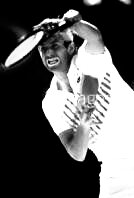 John McEnroe, looking less like a long-shot every day, sounded gleeful as he described how he reduced his second Australian Open victim to a state of confusion and frustration. In diabolical detail, McEnroe recounted the 6-1, 6-2, 6-1 demise today of Austria’s Alex Antonitsch, who played him much tougher in Montreal last summer (7-5, 2-6, 6-3). “He became very, very shaky,” McEnroe said after the 78-minute mismatch. “His forehand volley went completely astray. He had every sign of a guy who became totally confused and frustrated. He tried to hit the ball hard, then he tried to hit it soft, then a drop shot. So I just kept telling myself that I was doing the right thing.” McEnroe, who has lost only eight games in two matches, was doing everything right. Forehands and backhands kissed the lines. Volleys bounced away from Antonitsch at impossible angles. Eleven aces left the Austrian staring helplessly. At one point, at 0/40 in the seventh game of the second set, Antonitsch even tried to sneak by with an underhand serve. “It was a sign of frustration,” McEnroe said, adding that other players, including himself, might in the future try the tactic made famous by Michael Chang in the French Open last summer. “It worked, because I won the next three games.” said Ivan Lendl, the men’s defending champion and top seed, had another ho-hum day in his outdoor office as he reached the third round with a 6-4, 6-2, 6-3 victory over Spain’s Tomas Carbonell. Yannick Noah is back in all his glory and threatening to crash a party that seemed reserved for the usual big names in tennis. Diving and leaping, his dreadlocks flying wildly, Noah’s resurgence is sending a buzz through the Australian Open equal to excitement about the rejuvenation of McEnroe. Noah, a soft-spoken Frenchman with a powerful serve and an acrobatic net game, was electrifying in his 7-6(3), 6-3, 6-3 victory over aggressive, hard-hitting Ronald Agenor of Haiti. Boris Becker, wilting a little in the 108-degree heat on court, barely held off Scott Davis to reach the third round Thursday in the Australian Open. Becker, the No. 2 seed seeking his third straight Grand Slam title after winning Wimbledon and the U.S. Open, beat last week’s New Zealand Open champion 6-3, 7-6(4), 4-6, 6-2. “I thought I served very well today,” Becker said. “It was hard to see the ball in the sun. It’s hot out there. It’s not easy playing under those conditions, but it’s the same for both players.” Davis, ranked 38th and from Largo, Fla., had Becker talking to himself and grunting loudly in the third set. But the West German settled down in the fourth, wore Davis down with his power and took the match. Sweden’s Stefan Edberg, third seed among the men, beat West German Patrick Kuhnen 6-2, 6-2, 6-4. Australians celebrated the victory of native son Mark Woodforde over No. 11 Andrei Chesnokov of the Soviet Union 6-3, 6-2, 7-5. Unseeded Jonas Svensson of Sweden knocked out American Jim Courier, the 14th seed, 2-6, 6-2, 6-3, 6-2. Austria’s Thomas Muster, the men’s 15th seed, beat Christo van Rensburg of South Africa 1-6, 7-5, 7-5, 2-6, 8-6 in a nearly four-hour match. Aaron Krickstein, a 16-year-old phenomenon when he cracked the top 100 in 1983, is still chasing his first Grand Slam title and trying to get into the upper echelon of players. Mats Wilander, 25, knows what it’s like to be No. 1, to win an Australian Open, a French Open, a U.S. Open. He did it all in 1988 – and lost it all last year. But they operate now in the shadows of Lendl, Becker, Edberg and McEnroe, capable of beating any of them but more often
John McEnroe, looking less like a long-shot every day, sounded gleeful as he described how he reduced his second Australian Open victim to a state of confusion and frustration. In diabolical detail, McEnroe recounted the 6-1, 6-2, 6-1 demise today of Austria’s Alex Antonitsch, who played him much tougher in Montreal last summer (7-5, 2-6, 6-3). “He became very, very shaky,” McEnroe said after the 78-minute mismatch. “His forehand volley went completely astray. He had every sign of a guy who became totally confused and frustrated. He tried to hit the ball hard, then he tried to hit it soft, then a drop shot. So I just kept telling myself that I was doing the right thing.” McEnroe, who has lost only eight games in two matches, was doing everything right. Forehands and backhands kissed the lines. Volleys bounced away from Antonitsch at impossible angles. Eleven aces left the Austrian staring helplessly. At one point, at 0/40 in the seventh game of the second set, Antonitsch even tried to sneak by with an underhand serve. “It was a sign of frustration,” McEnroe said, adding that other players, including himself, might in the future try the tactic made famous by Michael Chang in the French Open last summer. “It worked, because I won the next three games.” said Ivan Lendl, the men’s defending champion and top seed, had another ho-hum day in his outdoor office as he reached the third round with a 6-4, 6-2, 6-3 victory over Spain’s Tomas Carbonell. Yannick Noah is back in all his glory and threatening to crash a party that seemed reserved for the usual big names in tennis. Diving and leaping, his dreadlocks flying wildly, Noah’s resurgence is sending a buzz through the Australian Open equal to excitement about the rejuvenation of McEnroe. Noah, a soft-spoken Frenchman with a powerful serve and an acrobatic net game, was electrifying in his 7-6(3), 6-3, 6-3 victory over aggressive, hard-hitting Ronald Agenor of Haiti. Boris Becker, wilting a little in the 108-degree heat on court, barely held off Scott Davis to reach the third round Thursday in the Australian Open. Becker, the No. 2 seed seeking his third straight Grand Slam title after winning Wimbledon and the U.S. Open, beat last week’s New Zealand Open champion 6-3, 7-6(4), 4-6, 6-2. “I thought I served very well today,” Becker said. “It was hard to see the ball in the sun. It’s hot out there. It’s not easy playing under those conditions, but it’s the same for both players.” Davis, ranked 38th and from Largo, Fla., had Becker talking to himself and grunting loudly in the third set. But the West German settled down in the fourth, wore Davis down with his power and took the match. Sweden’s Stefan Edberg, third seed among the men, beat West German Patrick Kuhnen 6-2, 6-2, 6-4. Australians celebrated the victory of native son Mark Woodforde over No. 11 Andrei Chesnokov of the Soviet Union 6-3, 6-2, 7-5. Unseeded Jonas Svensson of Sweden knocked out American Jim Courier, the 14th seed, 2-6, 6-2, 6-3, 6-2. Austria’s Thomas Muster, the men’s 15th seed, beat Christo van Rensburg of South Africa 1-6, 7-5, 7-5, 2-6, 8-6 in a nearly four-hour match. Aaron Krickstein, a 16-year-old phenomenon when he cracked the top 100 in 1983, is still chasing his first Grand Slam title and trying to get into the upper echelon of players. Mats Wilander, 25, knows what it’s like to be No. 1, to win an Australian Open, a French Open, a U.S. Open. He did it all in 1988 – and lost it all last year. But they operate now in the shadows of Lendl, Becker, Edberg and McEnroe, capable of beating any of them but more often 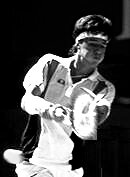 losing to them in the big matches. Krickstein, the son of a doctor and grandson of a rabbi, is ranked No. 7 in the world, a fine accomplishment but short of his dream of being No. 1. Soft-spoken and easy-going, Krickstein doesn’t mind laboring in relative obscurity and letting the pressure fall on others. “I can understand why people wouldn’t say I’m a threat to win the tournament – I’ve never got even to a final of a major“, he said yesterday after reaching the third round of the Australian by beating Ramesh Krishnan 6-1, 4-6, 6-3, 6-1. Wilander, a Swede who has homes in Greenwich and Monaco, says he just wants to “get back to scratch,” to find the winning formula after a year of injuries, aimlessness on the court and personal problems. After beating Canada’s Martin Wostenholme 6-2, 7-5, 6-3 to reach the third round, Wilander proclaimed himself more confident. “I sort of lost trust in my baseline game,” he said. “It was pretty bad, I think, but I’ve got it now.” Among the men posting second-round victories on Wednesday were Pete Sampras, who outlasted Spain’s Jordi Arrese 0-6, 6-2, 3-6, 6-1, 6-3; and Andrei Cherkasov of the Soviet Union, a 6-4, 5-7, 7-5, 6-0 winner over American Glenn Layendecker.
losing to them in the big matches. Krickstein, the son of a doctor and grandson of a rabbi, is ranked No. 7 in the world, a fine accomplishment but short of his dream of being No. 1. Soft-spoken and easy-going, Krickstein doesn’t mind laboring in relative obscurity and letting the pressure fall on others. “I can understand why people wouldn’t say I’m a threat to win the tournament – I’ve never got even to a final of a major“, he said yesterday after reaching the third round of the Australian by beating Ramesh Krishnan 6-1, 4-6, 6-3, 6-1. Wilander, a Swede who has homes in Greenwich and Monaco, says he just wants to “get back to scratch,” to find the winning formula after a year of injuries, aimlessness on the court and personal problems. After beating Canada’s Martin Wostenholme 6-2, 7-5, 6-3 to reach the third round, Wilander proclaimed himself more confident. “I sort of lost trust in my baseline game,” he said. “It was pretty bad, I think, but I’ve got it now.” Among the men posting second-round victories on Wednesday were Pete Sampras, who outlasted Spain’s Jordi Arrese 0-6, 6-2, 3-6, 6-1, 6-3; and Andrei Cherkasov of the Soviet Union, a 6-4, 5-7, 7-5, 6-0 winner over American Glenn Layendecker.
Third round: AP
Boris Becker, seeking his third Grand Slam tournament title in a row, beat Olivier Delaitre of France, 6-3, 6-1, 6-4. “The court is very sticky, and when you’re a little tired and just hanging in there, that’s when your ankle can go,” Becker said. “I’ve had too many problems in the past. I’m taping everything I have to tape.” Mark Woodforde, leading the 2nd set 5:4, after American David Wheaton won the first set 6-3, sprained his right ankle on a different court at the 3-year-old National Tennis Center. The courts are spongy, Rebound Ace hard surfaces and do not have a history of producing injuries. Woodforde was hitting a forehand from and open stance, and his foot “just grabbed,” Wheaton said. “It never came off the court.” John McEnroe is not only a model of decorum these days, he’s winning again, gliding easily into the round of 16 at the Australian on Friday with a 6-2, 6-3, 6-2 victory over fellow American Dan Goldie. ”It’s not the sort of situation where you have energy to burn in this weather,” McEnroe said. “The heat can catch  up to you at times.” Not even hecklers and chatty fans in the record crowd of 21,028 could ruffle McEnroe, who displayed his full repertoire of shots and bounced around the court as if he were 21. Ivan Lendl ousted Karel Novacek 6-4, 3-6, 6-4, 6-1. “I was always in defense because Karel was hitting the ball very well and it disrupted my pace” said Lendl, who had been forced to save break points in three different games of the 3rd set before obtained a decisive break. “I had a very good chance to win the third set and I could not keep my level as in the previous set” commented Novacek [61]. Stefan Edberg, the No. 3 seed, beat American Paul Chamberlin 6-3, 6-4, 6-1 and Aaron Krickstein, No. 5, beat Lars-Arden Wahlgren 6-7(4), 6-2, 6-3, 6-2. Mats Wilander of Sweden, the No. 8 seed, took 3 hours 10 minutes to beat Wally Masur of Australia, 6-4, 5-7, 6-4, 1-6, 6-3, taking the final point of the match on a net cord. Pete Sampras, a former standout at Palos Verdes High, recorded his third Australian Open victory of the week when the 18-year-old defeated Australia’s Todd Woodbridge, 7-5, 6-4, 6-2, in Melbourne. “I don’t think I’ll play my best tennis until I’m in my mid-20s,” Sampras said, “Serve-and-volleyers take longer to mature. After beating Wilander, I lost in the first round of three tournaments. I expected the win would carry me through the rest of the year. Unfortunately, it didn’t. I lost to pretty good players: Chang, Van Rensburg and Lundgren. Luck just wasn’t on my side like it was against Wilander. You have days when you’re not getting the line calls, or the breaks.” Sampras admits that lack of concentration still is a problem for him. “I do have a problem with my concentration going off at times. I’m not experienced enough yet.”
up to you at times.” Not even hecklers and chatty fans in the record crowd of 21,028 could ruffle McEnroe, who displayed his full repertoire of shots and bounced around the court as if he were 21. Ivan Lendl ousted Karel Novacek 6-4, 3-6, 6-4, 6-1. “I was always in defense because Karel was hitting the ball very well and it disrupted my pace” said Lendl, who had been forced to save break points in three different games of the 3rd set before obtained a decisive break. “I had a very good chance to win the third set and I could not keep my level as in the previous set” commented Novacek [61]. Stefan Edberg, the No. 3 seed, beat American Paul Chamberlin 6-3, 6-4, 6-1 and Aaron Krickstein, No. 5, beat Lars-Arden Wahlgren 6-7(4), 6-2, 6-3, 6-2. Mats Wilander of Sweden, the No. 8 seed, took 3 hours 10 minutes to beat Wally Masur of Australia, 6-4, 5-7, 6-4, 1-6, 6-3, taking the final point of the match on a net cord. Pete Sampras, a former standout at Palos Verdes High, recorded his third Australian Open victory of the week when the 18-year-old defeated Australia’s Todd Woodbridge, 7-5, 6-4, 6-2, in Melbourne. “I don’t think I’ll play my best tennis until I’m in my mid-20s,” Sampras said, “Serve-and-volleyers take longer to mature. After beating Wilander, I lost in the first round of three tournaments. I expected the win would carry me through the rest of the year. Unfortunately, it didn’t. I lost to pretty good players: Chang, Van Rensburg and Lundgren. Luck just wasn’t on my side like it was against Wilander. You have days when you’re not getting the line calls, or the breaks.” Sampras admits that lack of concentration still is a problem for him. “I do have a problem with my concentration going off at times. I’m not experienced enough yet.”
Fourth round: AP
John McEnroe [5], still crazy after all these years, threw his racket and a tantrum Sunday at the Australian Open and became only the third player tossed out of a Grand Slam event for misconduct. He let himself get rattled by missed shots, close calls and a baby’s cries, and after his default, with a 6-1, 4-6, 7-5, 2-4 lead against Mikael Pernfors, McEnroe said, ”I don’t really have anyone to blame but myself.” It was a sad and bizarre chapter in the career of McEnroe, 30, a former Australian Open champion. He came determined to win his first major tournament since the 1984 U.S. Open but instead flew home to California early today. Only two days before, after winning his third match and playing his best tennis in years, McEnroe talked about how important it is for him to keep his temper under control. Yet all it took for McEnroe to revert to his old ways was a tough match against Pernfors, the Swedish-born former Seminole Community College player and two-time NCAA champion at Georgia. McEnroe won the first set easily, but as Pernfors picked up his game in the second set, McEnroe became increasingly agitated. After netting a short drop shot, he smashed the ball on the ground. In the 3rd set, McEnroe took a 2:1 lead after an exchange of breaks, but on the changeover he stood in front of a lineswoman he thought made a bad call. Bouncing a ball on his racket and glaring at her, McEnroe was hit with a code violation for unsportsmanlike conduct by umpire Gerry Armstrong. McEnroe argued with Armstrong, then returned to play, finally held service, and went on to take the set. He seemed to be in control of the match and himself again but became distracted by a crying baby. ”Give him a drink, the boy’s 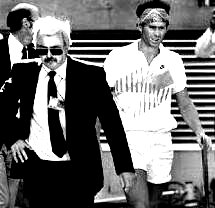 hungry,” McEnroe yelled toward the stands. With Pernfors ahead, 3:2, McEnroe fell behind, 15/30 on a wide forehand, then bounced his racket on the court. At deuce, McEnroe hit another forehand wide, then smashed the court again with his racket, cracking the head slightly. Armstrong called a code violation for racket abuse, and McEnroe responded by swearing at him and asking for Ken Farrar (in the picture), the Grand Slam chief of supervisors. Farrar came onto the court and talked with McEnroe, but McEnroe continued complaining and swearing, his four-letter words clearly audible to nearby fans and television viewers. Armstrong, with Farrar’s approval, called, ”Code violation, further abuse, default, Mr. McEnroe. Game, set, match.” Farrar later described McEnroe’s harangue as the most vile language he’d ever heard in a tennis match. McEnroe, composed and speaking softly a few minutes later, said his mistake was in not understanding the rules. He said he thought the rules of last year’s Grand Slam tournaments were in effect – four steps to default rather than three – warning, point, default. McEnroe was fined $6,500 – $5,000 for racket abuse, $500 for verbal abuse and $1,000 for default. It’s the first
hungry,” McEnroe yelled toward the stands. With Pernfors ahead, 3:2, McEnroe fell behind, 15/30 on a wide forehand, then bounced his racket on the court. At deuce, McEnroe hit another forehand wide, then smashed the court again with his racket, cracking the head slightly. Armstrong called a code violation for racket abuse, and McEnroe responded by swearing at him and asking for Ken Farrar (in the picture), the Grand Slam chief of supervisors. Farrar came onto the court and talked with McEnroe, but McEnroe continued complaining and swearing, his four-letter words clearly audible to nearby fans and television viewers. Armstrong, with Farrar’s approval, called, ”Code violation, further abuse, default, Mr. McEnroe. Game, set, match.” Farrar later described McEnroe’s harangue as the most vile language he’d ever heard in a tennis match. McEnroe, composed and speaking softly a few minutes later, said his mistake was in not understanding the rules. He said he thought the rules of last year’s Grand Slam tournaments were in effect – four steps to default rather than three – warning, point, default. McEnroe was fined $6,500 – $5,000 for racket abuse, $500 for verbal abuse and $1,000 for default. It’s the first  disqualification in the Open era. Bill Alvarez was defaulted from the French Open in 1963 during his second round match against Martin Mulligan. Alvarez won the 1st set 7-5, and was defaulted at 4-all in the 2nd set because got into a dispute with the umpire Fred Sherriff. McEnroe’s exit dominated talk at the Australian Open on Monday, overshadowing unseeded David Wheaton‘s 7-6(5), 6-4, 6-3 victory over fellow American Aaron Krickstein, the fifth seed, who was playing with a groin injury. No. 3 Stefan Edberg joined Wheaton in the quarterfinals by beating fellow Swede Jonas Svensson 6-2, 6-2, 6-4. Their countryman Mats Wilander, No. 8, beat Finland’s Veli Paloheimo, who played courageously and in obvious pain after spraining his right ankle in the second game of the second set. Paloheimo, down 7-5, 1-0 with Wilander serving, had his ankle taped but was considerably slower. He managed to win four games in the set, including a break, but weakened and lost 7-5, 6-4, 6-0. Ivan Lendl hit 46 errors yet never was threatened in beating Australian Simon Youl 6-1, 6-3, 6-1. Unseeded Soviet Andrei Cherkasov upset No. 9 Andres Gomez of Ecuador 2-6, 6-3, 7-6(6), 7-6(5). Krickstein clearly was hampered by the injury to the left side of his groin, which he suffered late in his third-round victory over Swede Lars Wahlgren. ”I hoped I’d be able to play through it,” Krickstein said. “It was OK for a set, but at 2-all in the second I hurt it again. I’ve strained it pretty bad and I couldn’t move very well to my right at all. It was hard to concentrate. I knew I wasn’t 100 percent by any means. I was just hoping with treatment it would be OK.” Krickstein said he was not certain about his Davis Cup status. ”You never know. The injury is high on the bone and it’s a tough one to treat. I’ll just have to wait and see what happens in the next few days.” Wheaton, the last American in the men’s singles, said he was aware late in the match that Krickstein was not moving freely. ”I could see his lunging ability really wasn’t there,” he said. Boris Becker came to the defense of McEnroe on Monday, saying the misconduct rules are wrong and warning tennis officials against trying to turn players into robots. “Tennis has to be careful,” Becker said after his fourth round match at the Australian Open while McEnroe was flying home to Malibu after being thrown out of the tournament for smashing his tennis racket and cursing. “Not everybody is like a computer. Tennis is more than just hitting a few balls. It is very good to have a John McEnroe, and I hope we have a couple of more. Sure, you can’t say what he said to the umpire, but there should be a different penalty than just taking him out of the match.” Becker took some of the attention off the McEnroe affair with a slick escape from two sets down Monday night, a trick reminiscent of his route to the U.S. Open championship last fall. Down a break in the third set to 1989 Australian finalist Miloslav Mecir, Becker stormed back to win, 4-6, 6-7(6), 6-4, 6-1, 6-1, and reach the quarterfinals against three-time champion Wilander. “I was quite astonished I got out of it,” Becker said. It was the third time in recent months that Becker has come back from two sets down – the first time against Derrick Rostagno in the second round of the U.S. Open, the second time against Andre Agassi in Davis Cup play. “You have to tell yourself not to go down,” Becker said. “If I go down, the other
disqualification in the Open era. Bill Alvarez was defaulted from the French Open in 1963 during his second round match against Martin Mulligan. Alvarez won the 1st set 7-5, and was defaulted at 4-all in the 2nd set because got into a dispute with the umpire Fred Sherriff. McEnroe’s exit dominated talk at the Australian Open on Monday, overshadowing unseeded David Wheaton‘s 7-6(5), 6-4, 6-3 victory over fellow American Aaron Krickstein, the fifth seed, who was playing with a groin injury. No. 3 Stefan Edberg joined Wheaton in the quarterfinals by beating fellow Swede Jonas Svensson 6-2, 6-2, 6-4. Their countryman Mats Wilander, No. 8, beat Finland’s Veli Paloheimo, who played courageously and in obvious pain after spraining his right ankle in the second game of the second set. Paloheimo, down 7-5, 1-0 with Wilander serving, had his ankle taped but was considerably slower. He managed to win four games in the set, including a break, but weakened and lost 7-5, 6-4, 6-0. Ivan Lendl hit 46 errors yet never was threatened in beating Australian Simon Youl 6-1, 6-3, 6-1. Unseeded Soviet Andrei Cherkasov upset No. 9 Andres Gomez of Ecuador 2-6, 6-3, 7-6(6), 7-6(5). Krickstein clearly was hampered by the injury to the left side of his groin, which he suffered late in his third-round victory over Swede Lars Wahlgren. ”I hoped I’d be able to play through it,” Krickstein said. “It was OK for a set, but at 2-all in the second I hurt it again. I’ve strained it pretty bad and I couldn’t move very well to my right at all. It was hard to concentrate. I knew I wasn’t 100 percent by any means. I was just hoping with treatment it would be OK.” Krickstein said he was not certain about his Davis Cup status. ”You never know. The injury is high on the bone and it’s a tough one to treat. I’ll just have to wait and see what happens in the next few days.” Wheaton, the last American in the men’s singles, said he was aware late in the match that Krickstein was not moving freely. ”I could see his lunging ability really wasn’t there,” he said. Boris Becker came to the defense of McEnroe on Monday, saying the misconduct rules are wrong and warning tennis officials against trying to turn players into robots. “Tennis has to be careful,” Becker said after his fourth round match at the Australian Open while McEnroe was flying home to Malibu after being thrown out of the tournament for smashing his tennis racket and cursing. “Not everybody is like a computer. Tennis is more than just hitting a few balls. It is very good to have a John McEnroe, and I hope we have a couple of more. Sure, you can’t say what he said to the umpire, but there should be a different penalty than just taking him out of the match.” Becker took some of the attention off the McEnroe affair with a slick escape from two sets down Monday night, a trick reminiscent of his route to the U.S. Open championship last fall. Down a break in the third set to 1989 Australian finalist Miloslav Mecir, Becker stormed back to win, 4-6, 6-7(6), 6-4, 6-1, 6-1, and reach the quarterfinals against three-time champion Wilander. “I was quite astonished I got out of it,” Becker said. It was the third time in recent months that Becker has come back from two sets down – the first time against Derrick Rostagno in the second round of the U.S. Open, the second time against Andre Agassi in Davis Cup play. “You have to tell yourself not to go down,” Becker said. “If I go down, the other 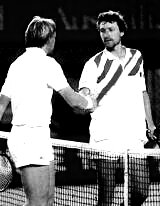 guy has to beat me. So it’s first a struggle against yourself. That’s the first fight you have to win, and then your opponent.” Becker won both fights, turning up the level of his game midway through the second set after one fan called out, “Hey, Boris, you want to be No. 1?” and another fan yelled, “Remember Davis Cup in America.” Becker’s first serve was off in the opening set, when he seemed distracted by cawing crows on the rim of the stadium and frustrated by the passing shots of Mecir, who broke Becker three times. Becker blew a 4:0 lead in the second-set tiebreaker, double-faulting to 4:4 and losing it on a lunging forehand he hit long. But after Mecir broke him in the third set for a 3:1 lead, the match suddenly changed. Mecir weakened – missing a short drop shot, double-faulting and getting broken at love after two more errors. It was the last very good display by the 25-year-old Mecir [25], whose injury forced to premature retirement six months later. Yannick Noah, the No. 12 seed, defeated Pete Sampras 6-3, 6-4, 3-6, 6-2.
guy has to beat me. So it’s first a struggle against yourself. That’s the first fight you have to win, and then your opponent.” Becker won both fights, turning up the level of his game midway through the second set after one fan called out, “Hey, Boris, you want to be No. 1?” and another fan yelled, “Remember Davis Cup in America.” Becker’s first serve was off in the opening set, when he seemed distracted by cawing crows on the rim of the stadium and frustrated by the passing shots of Mecir, who broke Becker three times. Becker blew a 4:0 lead in the second-set tiebreaker, double-faulting to 4:4 and losing it on a lunging forehand he hit long. But after Mecir broke him in the third set for a 3:1 lead, the match suddenly changed. Mecir weakened – missing a short drop shot, double-faulting and getting broken at love after two more errors. It was the last very good display by the 25-year-old Mecir [25], whose injury forced to premature retirement six months later. Yannick Noah, the No. 12 seed, defeated Pete Sampras 6-3, 6-4, 3-6, 6-2.
Quarterfinals: AP
Three-time Australian champion Mats Wilander [15] ended Boris Becker‘s [2] bid for a third successive Grand Slam title in a stunning upset Wednesday as wild winds played havoc and fans succumbed to the heat. Defending champion Ivan Lendl [1] and two-time former champion Stefan  Edberg [3] also overcame the heat, winds and eager, young opponents to reach the semifinals. For the second consecutive day, at least 50 fans among the crowd of about 20,000 were treated for heat exhaustion, but none was seriously ill, officials said. The temperature on the rubber-bottomed hard courts was 115 degrees, down from the 140 degrees on Tuesday, but the dry, hot winds of up to 35 mph tossed around baseline shots. Away from the court, the temperature reached 99 degrees (37 Celsius). Wilander, winner of the Australian Open in 1983, 1984 and 1988, had been struggling the past year and dropped to No. 15 in the rankings, but he came back to show his old form in beating No. 2 Becker 6-4, 6-4, 6-2. Wilander whipped strong passing shots by the net-charging Becker, who grew increasingly frustrated and finally backed up to the baseline and began playing Wilander’s style. Like a crafty counter-puncher taking apart a wild-swinging fighter, Wilander, 25, calmly took the 22-year-old Becker’s measure in a 2-hour 15-minute match. The loss by Becker stalled his drive to catch up to No. 1 Lendl, and left him wondering about a jinx in the Australian, where he never has gone past the quarterfinals in five appearances. Lendl, his legionnaire’s hat flapping and his ground-strokes cutting through winds that knocked over table umbrellas, beat Andrei Cherkasov [46] 6-3, 6-2, 6-3 on the partly enclosed stadium center court. ”The wind was a hot wind,” Lendl said. ”It was pretty bad. It’s not a nice way to play. I didn’t want to have to be out there for five sets.” Edberg, the only hatless player of the day, had to cope with even crazier winds on court one and a more difficult challenger in American serve-and-volleyer David Wheaton. The third-seeded Edberg, who warmed up for the match by playing nearly four hours in the heat Tuesday, beat Wheaton 7-5, 7-6(4), 3-6, 6-2. Wheaton [46], battled adverse weather conditions – on-court temperatures soared to 115 degrees and an intense wind played havoc with the ball – and a much more experienced opponent. “It wasn’t a pretty match,” Wheaton said. “There weren’t a lot of spectacular shots. You just go out there and get your business done.” Wheaton, 20, had some help on the way to the quarters. Mark Woodforde retired with an ankle injury in their third-round match. Aaron Krickstein, the No. 5 seed, hindered by a groin injury, didn’t have much fight in their round-of-16 duel. The tall, lanky Wheaton knows he isn’t yet in the big boys’ league and readily admits there’s a subtle difference between him and the Edbergs of the world. Meanwhile, Edberg said he was “pumped” to reach the semifinals, an advance that could help him vault past Becker in the chase for Ivan Lendl’s No. 1 spot. Edberg led 4:0* in the 2nd set, but Wheaton recovered, attacking the net more aggressively and serving better, and took the next five games. Leading by 6:5, he had two chances to break Edberg and take the second set after ripping a cross-court forehand winner to make it 15/40. However, Edberg won four straight points to hold, then won the tie-break by taking four of the last five points and pumped his fist a couple of more times. The last time Yannick Noah [13] made a Grand Slam semifinal he went on to win the French Open. That was in 1983. Seven years later, the Frenchman, in the semifinals of the Australian Open, gets another chance to win a Grand Slam title – and to deal with the pressure he put on himself and the expectations others had of him. He’s had his ups and downs, brooded about quitting last year, yet his love for the game kept bringing him back.
Edberg [3] also overcame the heat, winds and eager, young opponents to reach the semifinals. For the second consecutive day, at least 50 fans among the crowd of about 20,000 were treated for heat exhaustion, but none was seriously ill, officials said. The temperature on the rubber-bottomed hard courts was 115 degrees, down from the 140 degrees on Tuesday, but the dry, hot winds of up to 35 mph tossed around baseline shots. Away from the court, the temperature reached 99 degrees (37 Celsius). Wilander, winner of the Australian Open in 1983, 1984 and 1988, had been struggling the past year and dropped to No. 15 in the rankings, but he came back to show his old form in beating No. 2 Becker 6-4, 6-4, 6-2. Wilander whipped strong passing shots by the net-charging Becker, who grew increasingly frustrated and finally backed up to the baseline and began playing Wilander’s style. Like a crafty counter-puncher taking apart a wild-swinging fighter, Wilander, 25, calmly took the 22-year-old Becker’s measure in a 2-hour 15-minute match. The loss by Becker stalled his drive to catch up to No. 1 Lendl, and left him wondering about a jinx in the Australian, where he never has gone past the quarterfinals in five appearances. Lendl, his legionnaire’s hat flapping and his ground-strokes cutting through winds that knocked over table umbrellas, beat Andrei Cherkasov [46] 6-3, 6-2, 6-3 on the partly enclosed stadium center court. ”The wind was a hot wind,” Lendl said. ”It was pretty bad. It’s not a nice way to play. I didn’t want to have to be out there for five sets.” Edberg, the only hatless player of the day, had to cope with even crazier winds on court one and a more difficult challenger in American serve-and-volleyer David Wheaton. The third-seeded Edberg, who warmed up for the match by playing nearly four hours in the heat Tuesday, beat Wheaton 7-5, 7-6(4), 3-6, 6-2. Wheaton [46], battled adverse weather conditions – on-court temperatures soared to 115 degrees and an intense wind played havoc with the ball – and a much more experienced opponent. “It wasn’t a pretty match,” Wheaton said. “There weren’t a lot of spectacular shots. You just go out there and get your business done.” Wheaton, 20, had some help on the way to the quarters. Mark Woodforde retired with an ankle injury in their third-round match. Aaron Krickstein, the No. 5 seed, hindered by a groin injury, didn’t have much fight in their round-of-16 duel. The tall, lanky Wheaton knows he isn’t yet in the big boys’ league and readily admits there’s a subtle difference between him and the Edbergs of the world. Meanwhile, Edberg said he was “pumped” to reach the semifinals, an advance that could help him vault past Becker in the chase for Ivan Lendl’s No. 1 spot. Edberg led 4:0* in the 2nd set, but Wheaton recovered, attacking the net more aggressively and serving better, and took the next five games. Leading by 6:5, he had two chances to break Edberg and take the second set after ripping a cross-court forehand winner to make it 15/40. However, Edberg won four straight points to hold, then won the tie-break by taking four of the last five points and pumped his fist a couple of more times. The last time Yannick Noah [13] made a Grand Slam semifinal he went on to win the French Open. That was in 1983. Seven years later, the Frenchman, in the semifinals of the Australian Open, gets another chance to win a Grand Slam title – and to deal with the pressure he put on himself and the expectations others had of him. He’s had his ups and downs, brooded about quitting last year, yet his love for the game kept bringing him back.  And he feels he is better prepared to handle the pressure now. “I look forward to winning.” the 29-year-old Noah said. “When you’re young, you take (winning) for granted. Being out of the big matches for a long time helps me appreciate it.” Noah is playing with his old passion for the game. His renewed interest is encouraging because last year it looked as if he might be gone for good. “Five months ago I was thinking about stopping playing,” Noah said. “I didn’t think I could win a match. And now I’m in the semifinals.” Noah was in command today as he beat Sweden’s Mikael Pernfors 6-3, 7-5, 6-2 in the quarterfinals. Pernfors was pushed into a deep defensive by Noah’s constant attacks at the net on both, service and return games. Noah got eleven points behind overheads. The Swede managed to break the Frenchman three times. After the tournament, Pernfors waited more than a year for a match victory at the main level due to injuries.
And he feels he is better prepared to handle the pressure now. “I look forward to winning.” the 29-year-old Noah said. “When you’re young, you take (winning) for granted. Being out of the big matches for a long time helps me appreciate it.” Noah is playing with his old passion for the game. His renewed interest is encouraging because last year it looked as if he might be gone for good. “Five months ago I was thinking about stopping playing,” Noah said. “I didn’t think I could win a match. And now I’m in the semifinals.” Noah was in command today as he beat Sweden’s Mikael Pernfors 6-3, 7-5, 6-2 in the quarterfinals. Pernfors was pushed into a deep defensive by Noah’s constant attacks at the net on both, service and return games. Noah got eleven points behind overheads. The Swede managed to break the Frenchman three times. After the tournament, Pernfors waited more than a year for a match victory at the main level due to injuries.
Semifinals: AP
Ivan Lendl wielded his racket like a machine gun from the baseline and Stefan Edberg attacked at the net early today as they set up a meeting in the Australian Open finals. In swift executions by different methods, defending champion Lendl and two-time former champion Edberg performed almost flawlessly in two of the most one-sided Grand Slam semifinals since the Open era began in 1968. Lendl passed Yannick Noah left and right when the frustrated Frenchman charged the net 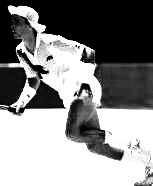 and out-dueled him from the baseline when Noah stayed back to win 6-4, 6-1, 6-2 in 1 hour, 47 minutes. Lendl expects to use the same strategy in the finals, commandeering the baseline most of the time and coming to the net on occasion to keep Edberg guessing. “Always when Stefan and I play, he will serve and volley and I play defense,” Lendl said. “I will try to fend him off. It depends on how much impression I make on his serve. If he holds at love or 15, he can take chances on my serve.” Edberg handed sluggish fellow Swede Mats Wilander the worst defeat in his 155 Grand Slam matches, 6-1, 6-1, 6-2. Edberg simply had too many weapons for Wilander and put him away with merciful quickness in 82 minutes. “I had one of those days where I almost played perfect tennis,” Edberg said. “I think I played as well as I could. The key was I hit a lot of first serves today. I had great timing on my serves.” No. 3 Edberg hit 80 percent of his first serves and put away 39 volley winners to Wilander’s one. “After a while you feel helpless,” said the eighth-seeded Wilander, who left all his fight in his quarterfinal victory. “I don’t think he aced me once,” he said. “That’s when you feel helpless, when you hit a good return and he hits a great volley. When the other guy is playing as good as Stefan, you wait for him to lay off because you don’t expect him to play that good the whole match.” From start to finish, when Edberg served out the last game to love, it was the most one-sided Australian semifinal since Wilander beat Johan Kriek (6-1, 6-0, 6-2) in 1984 en route to his second Open title. Lendl, born in Czechoslovakia but now living in Greenwich, Conn., clicked on 67 percent of his first serves, drilled 36 winners past Noah and cut down on errors as the match progressed. Lendl, never broken in the three sets, broke Noah in the first game of the match and the last, and four times in between. “He was overpowering me from the baseline,’‘ said Noah.
and out-dueled him from the baseline when Noah stayed back to win 6-4, 6-1, 6-2 in 1 hour, 47 minutes. Lendl expects to use the same strategy in the finals, commandeering the baseline most of the time and coming to the net on occasion to keep Edberg guessing. “Always when Stefan and I play, he will serve and volley and I play defense,” Lendl said. “I will try to fend him off. It depends on how much impression I make on his serve. If he holds at love or 15, he can take chances on my serve.” Edberg handed sluggish fellow Swede Mats Wilander the worst defeat in his 155 Grand Slam matches, 6-1, 6-1, 6-2. Edberg simply had too many weapons for Wilander and put him away with merciful quickness in 82 minutes. “I had one of those days where I almost played perfect tennis,” Edberg said. “I think I played as well as I could. The key was I hit a lot of first serves today. I had great timing on my serves.” No. 3 Edberg hit 80 percent of his first serves and put away 39 volley winners to Wilander’s one. “After a while you feel helpless,” said the eighth-seeded Wilander, who left all his fight in his quarterfinal victory. “I don’t think he aced me once,” he said. “That’s when you feel helpless, when you hit a good return and he hits a great volley. When the other guy is playing as good as Stefan, you wait for him to lay off because you don’t expect him to play that good the whole match.” From start to finish, when Edberg served out the last game to love, it was the most one-sided Australian semifinal since Wilander beat Johan Kriek (6-1, 6-0, 6-2) in 1984 en route to his second Open title. Lendl, born in Czechoslovakia but now living in Greenwich, Conn., clicked on 67 percent of his first serves, drilled 36 winners past Noah and cut down on errors as the match progressed. Lendl, never broken in the three sets, broke Noah in the first game of the match and the last, and four times in between. “He was overpowering me from the baseline,’‘ said Noah.
Final: Nina Bick
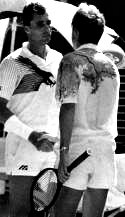 Ivan Lendl repeated as Australian Open men’s champion today when Stefan Edberg retired with a stomach-muscle injury in the third set. It was the first time in the Australian Open’s 85-year history that a men’s finalist has quit in the middle of a match. Lendl led 4-6, 7-6(3), 5-2 when Edberg told the umpire he could not continue. Edberg received massage by a trainer during the match and rubbed his sore muscles several times during breaks. Lendl received $200,000 from the $3 million purse. Edberg got $100,000. Lendl holds a lifetime advantage of 10-6, including a victory by Edberg in the semifinals of the Australian Open in 1985. Edberg became only the second player to retire from a Grand Slam final because of an injury. In 1911 at Wimbledon, Anthony Wilding of New Zealand won when H. Roper Barrett was forced to retire after the fourth set. The strained muscle, which Edberg injured in the semifinals, hampered the Swede from the opening game of the match, restricting his movement around court. Despite the discomfort, Edberg served for a two-set lead at 6:5 in the second set (after saving three set points in the 10th game). With the Swede serving at only 75 percent of his usual pace, Lendl was able to break him and then went on to take the tie breaker, 7/3, and even the match at one set all. ”Maybe if I could have got that second set I could have bluffed my way through and won in three sets,” Edberg said. ”But right after the second set I thought I wasn’t going to last much longer. There’s no way I could beat Ivan by staying back and not being able to serve.” During the end changes in the second set, Todd Snyder, the tour trainer, applied ice to Edberg’s abdomen in a vain attempt to reduce the pain, but most of the capacity crowd of 15,000 were unaware of his condition. But by the seventh game of the third set, Edberg’s condition became apparent when he could only tap two Lendl lobs back to his opponent. His sudden walk past the umpire’s chair to shake Lendl’s hand momentarily stunned the fans as the umpire announced: ”Because of injury, Mr. Edberg has retired. Game, set and match to Mr. Lendl.” Edberg said he felt a sharp pain in his left abdominal muscles in the last game of his semifinal victory over Mats Wilander on Friday. “I took care of it and in practice yesterday it seemed all right, but during warm-up today I felt the pain right from the beginning,” Edberg said. ”I thought it might just be stiffness but it got worse and worse.” Last year in the Australian Open, Edberg was forced out of the quarterfinals after injuring his back in a match against Pat Cash. Edberg’s sudden exit from the final took some of the gloss off of Lendl’s consecutive championships and his eighth Grand Slam crown. ”It was not the greatest way to win,” Lendl said. ”Stefan displayed great courage in continuing to play when he was in such pain. I’ve had the same injury and it really hurts.” Lendl said he realized something serious was amiss with Edberg after he broke the strangely
Ivan Lendl repeated as Australian Open men’s champion today when Stefan Edberg retired with a stomach-muscle injury in the third set. It was the first time in the Australian Open’s 85-year history that a men’s finalist has quit in the middle of a match. Lendl led 4-6, 7-6(3), 5-2 when Edberg told the umpire he could not continue. Edberg received massage by a trainer during the match and rubbed his sore muscles several times during breaks. Lendl received $200,000 from the $3 million purse. Edberg got $100,000. Lendl holds a lifetime advantage of 10-6, including a victory by Edberg in the semifinals of the Australian Open in 1985. Edberg became only the second player to retire from a Grand Slam final because of an injury. In 1911 at Wimbledon, Anthony Wilding of New Zealand won when H. Roper Barrett was forced to retire after the fourth set. The strained muscle, which Edberg injured in the semifinals, hampered the Swede from the opening game of the match, restricting his movement around court. Despite the discomfort, Edberg served for a two-set lead at 6:5 in the second set (after saving three set points in the 10th game). With the Swede serving at only 75 percent of his usual pace, Lendl was able to break him and then went on to take the tie breaker, 7/3, and even the match at one set all. ”Maybe if I could have got that second set I could have bluffed my way through and won in three sets,” Edberg said. ”But right after the second set I thought I wasn’t going to last much longer. There’s no way I could beat Ivan by staying back and not being able to serve.” During the end changes in the second set, Todd Snyder, the tour trainer, applied ice to Edberg’s abdomen in a vain attempt to reduce the pain, but most of the capacity crowd of 15,000 were unaware of his condition. But by the seventh game of the third set, Edberg’s condition became apparent when he could only tap two Lendl lobs back to his opponent. His sudden walk past the umpire’s chair to shake Lendl’s hand momentarily stunned the fans as the umpire announced: ”Because of injury, Mr. Edberg has retired. Game, set and match to Mr. Lendl.” Edberg said he felt a sharp pain in his left abdominal muscles in the last game of his semifinal victory over Mats Wilander on Friday. “I took care of it and in practice yesterday it seemed all right, but during warm-up today I felt the pain right from the beginning,” Edberg said. ”I thought it might just be stiffness but it got worse and worse.” Last year in the Australian Open, Edberg was forced out of the quarterfinals after injuring his back in a match against Pat Cash. Edberg’s sudden exit from the final took some of the gloss off of Lendl’s consecutive championships and his eighth Grand Slam crown. ”It was not the greatest way to win,” Lendl said. ”Stefan displayed great courage in continuing to play when he was in such pain. I’ve had the same injury and it really hurts.” Lendl said he realized something serious was amiss with Edberg after he broke the strangely 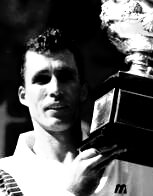 subdued Swede’s serve in the second game of the match. “He was not hitting his serves right; he was kicking it all the time,” Lendl said. ”I just tried to play out each point. Even when he was in a winning position I tried a lob or something to make him play.” Lendl’s victory in the Australian Open has consolidated his hold on the No. 1 world ranking. He said, however, that he would still stay with his plan to skip the French Open and concentrate on winning Wimbledon, the only major he has never won (indeed, he didn’t play at Roland Garros ’90). Edberg’s retirement from the final because of injury climaxed a turbulent tournament, which saw the disqualification of John McEnroe for three code of conduct violations in his match against Mikael Pernfors of Sweden, and the withdrawal of Gabriela Sabatini, the second-seeded players and Mark Woodforde of Australia, within an hour of each other after they fell injuring their ankles midway through third-round matches. Lendl’s 84th title, 8th and last major. Stats of the final
subdued Swede’s serve in the second game of the match. “He was not hitting his serves right; he was kicking it all the time,” Lendl said. ”I just tried to play out each point. Even when he was in a winning position I tried a lob or something to make him play.” Lendl’s victory in the Australian Open has consolidated his hold on the No. 1 world ranking. He said, however, that he would still stay with his plan to skip the French Open and concentrate on winning Wimbledon, the only major he has never won (indeed, he didn’t play at Roland Garros ’90). Edberg’s retirement from the final because of injury climaxed a turbulent tournament, which saw the disqualification of John McEnroe for three code of conduct violations in his match against Mikael Pernfors of Sweden, and the withdrawal of Gabriela Sabatini, the second-seeded players and Mark Woodforde of Australia, within an hour of each other after they fell injuring their ankles midway through third-round matches. Lendl’s 84th title, 8th and last major. Stats of the final
********************************




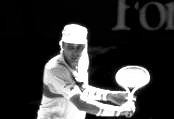


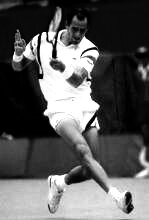
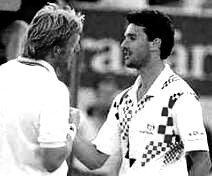
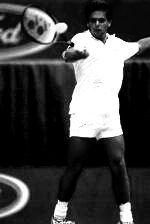
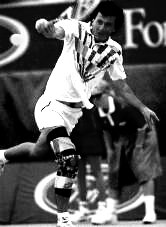
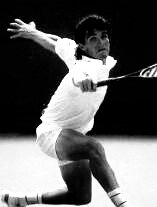
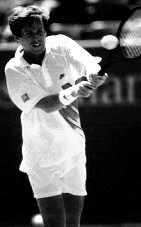
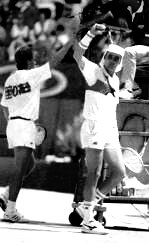

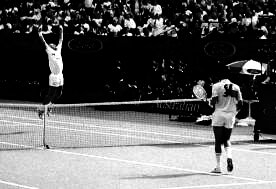
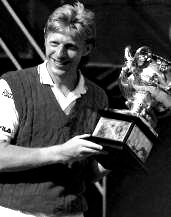
YT films:
1990
McEnroe defaulted
Noah vs. Pernfors
Edberg vs. Wilander
Lendl vs. Noah
Lendl vs. Edberg
1991
Becker vs. Camporese
Lendl vs. Edberg
Becker vs. Lendl